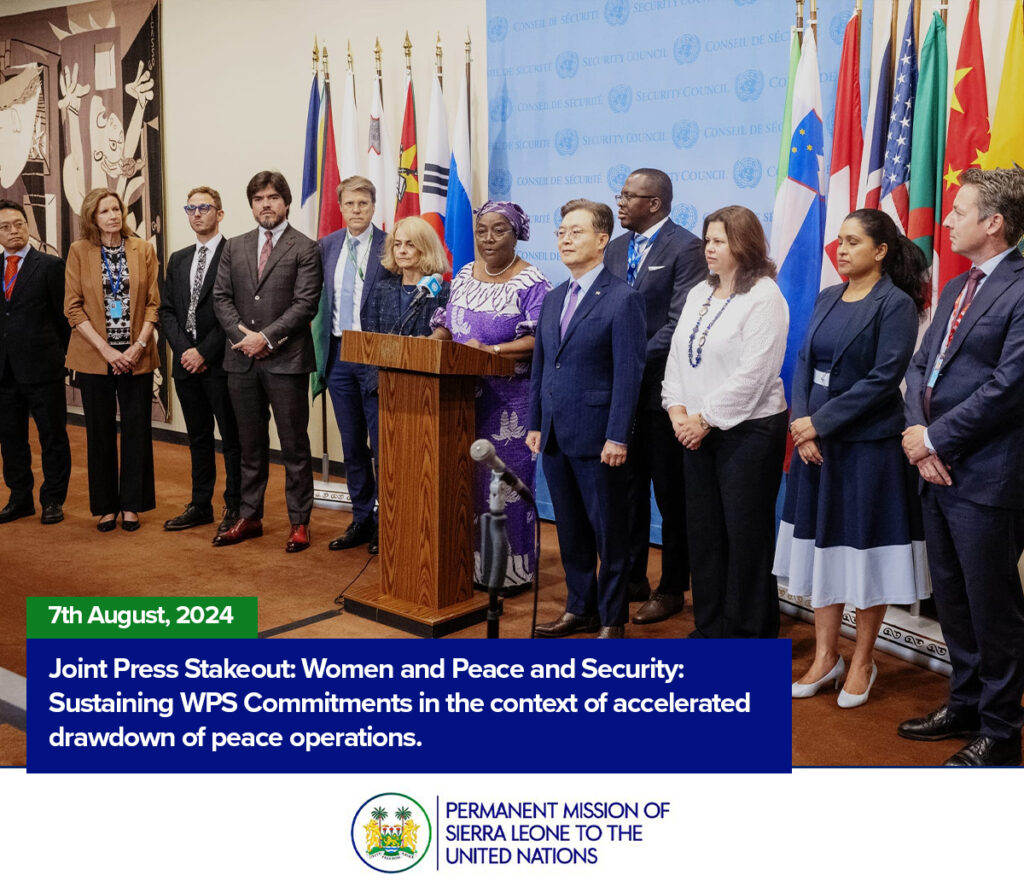Women and Peace and Security: “Sustaining WPS Commitments in the context of accelerated drawdown of peace operations
We, the Security Council signatories of the Statement of Shared Commitments for the principles of Women, Peace, and Security (WPS), Ecuador, France, Guyana, Japan, Malta, Republic of Korea, Sierra Leone, Slovenia, Switzerland, the United Kingdom and the United States of America, reaffirm our commitment to women’s full, equal, meaningful and safe participation in all conflict prevention, resolution and peacebuilding efforts and to ensuring gender perspectives are consistently applied to country situations and thematic issues in the Security Council.
We express our grave concern about the risks and negative impacts that the abrupt drawdown, reconfiguration or termination of the United Nations peacekeeping operations and special political missions have on women and girls’ rights. We are especially concerned about situations where a United Nations mission must leave without even the minimum conditions for a planned transition in place. This has the potential of not only jeopardizing hard-won peace gains, but also important progress made in gender equality. It also puts women and girls` rights at risk of not being exercised and further of being abused, including due to a lack of protection from sexual and gender-based violence (SGBV), reduced ability for SGBV survivors to safely access critical services, attacks on women human rights defenders and peacebuilders, and a significantly reduced capacity to monitor the situation of women and girls in these countries, many of whom are still affected by conflict.
The UN’s peace operations are among the United Nations’ most impactful tools to implement the Security Council’s resolutions on women, peace, and security. When they leave, or when they are requested to leave, they can leave a vacuum that creates the conditions for harm. In the Security Council, several women civil society representatives have warned of the risks of hasty departures, and the impact that these would have on the security of women and girls, humanitarian access and the rule of law, and time has unfortunately proven them right.
To address the disproportionate impact on the rights of women and girls, we underscore the need for comprehensive gender-responsive conflict analysis and technical gender expertise to guide gender responsive transition processes and other contingency. This is essential for defining gender- responsive benchmarks that ensure missions are not forced to exist without fulfilling minimum conditions that will ensure the sustainability of WPS commitments. We must ensure, in this regard, that the United Nations Country teams are endowed with the appropriate expertise in the wake of a mission`s departure, to preserve continuity in terms of reporting and addressing human rights violations and abuses, notably sexual and gender- based violence. We also reiterate the call of the Security Council for women’s full, equal, meaningful leadership and safe participation throughout the transition processes and to ensure that the needs of women and girls are fully integrated in all stages of mission transitions, including through the establishment of and compliance with gender- specific benchmarks.
These objectives have been articulated in Security Council resolutions 2553 and 2594 relating to early and integrated planning and coordination on transitions but are often not put into practice, and accelerated departures make these tasks much harder. We further underscore the need for host governments and their international partners to collaborate with United Nations Country Teams, national actors, including women’s civil society organizations, and any other international actors working on peace and security in these contexts who have the expertise, financial resources, and political space to facilitate interventions directed at the promotion and protection of the human rights of women and girls and leadership and participation at all stages of peace and security processes.
Finally, we reiterate the important role that female peacekeepers and gender advisors play in facilitating the necessary outreach to women and girls and the need to continue supporting gender parity.
We, the signatories of the WPS Shared Commitments, believe that WPS can be better integrated into Security Council decisions related to drawdown, reconfiguration or termination of United Nations peacekeeping operations or special political missions. We are committed to working together to ensure more inclusive and well-planned transition processes that are guided by comprehensive gender analysis and that allows for women’s full, equal, and meaningful leadership and safe participation in public life and the prevention of and response to sexual and gender-based violence during and after the withdrawal of a United Nations mission.
Thank you.



